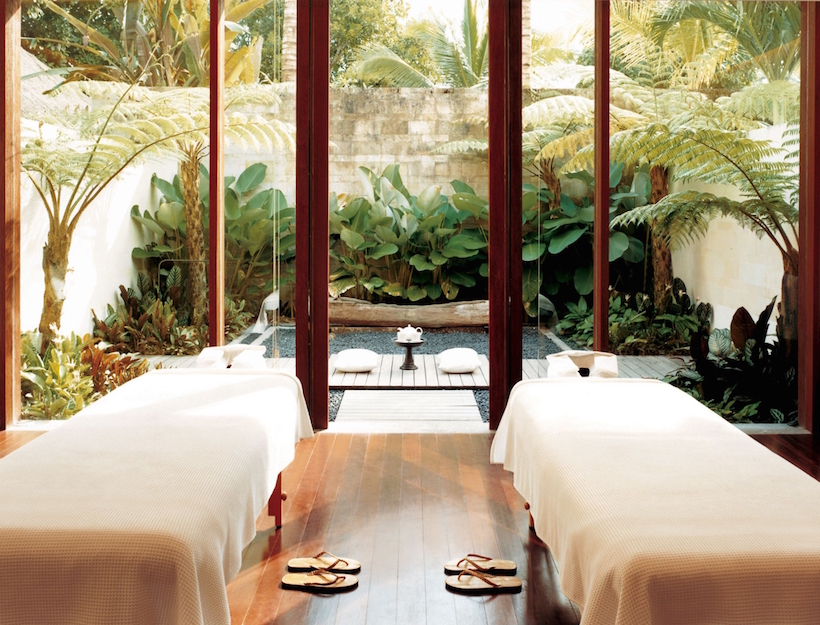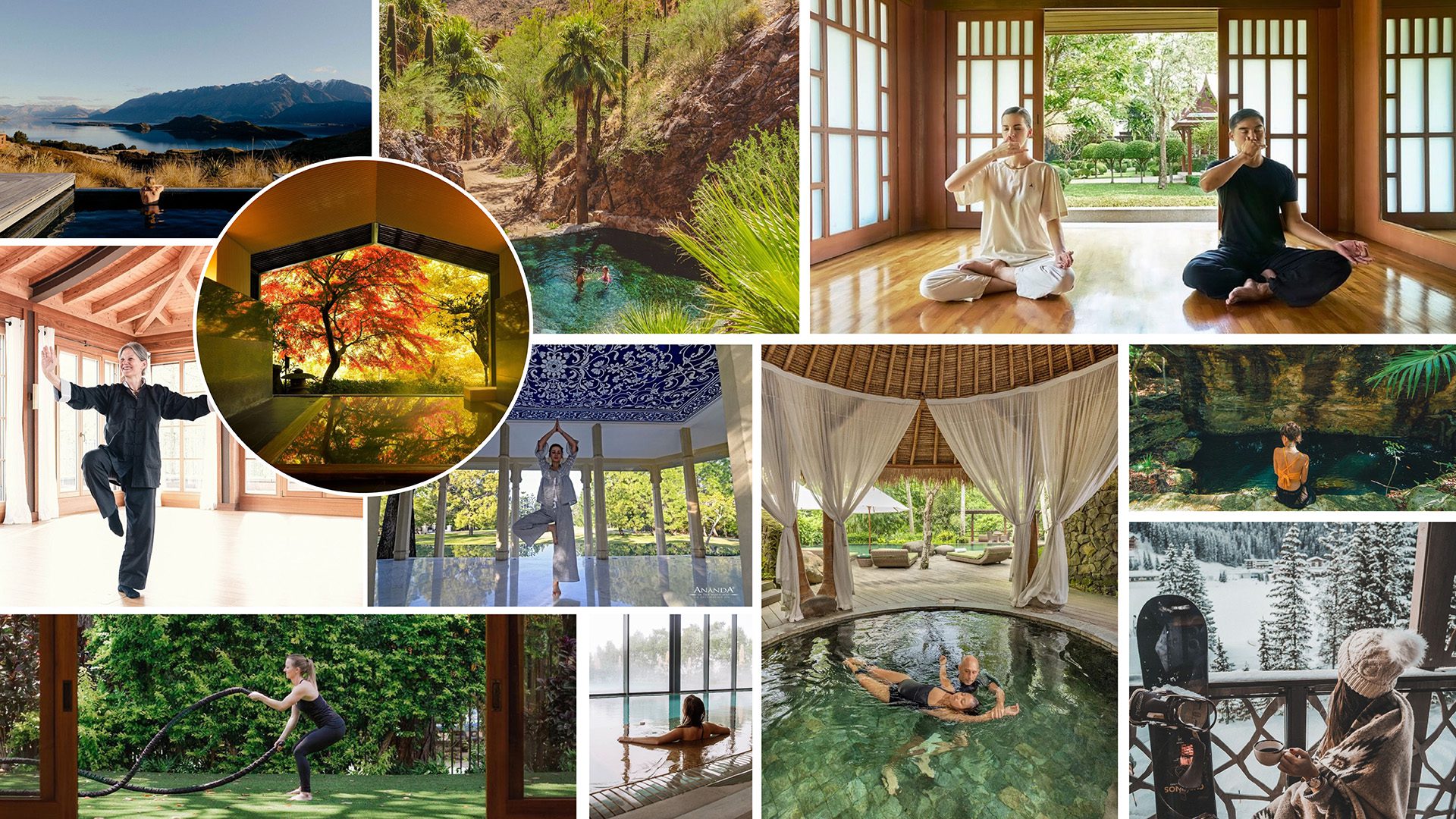A Guide to Spiritual and Wellness Retreats Worldwide: Escape the everyday grind and discover inner peace. This isn’t your grandma’s spa day; we’re talking transformative journeys to breathtaking locations, where yoga flows meet mindful meditation, and detox cleanses become spiritual awakenings. Imagine yourself rejuvenated, centered, and ready to conquer the world – that’s the power of a well-chosen retreat.
From silent retreats in the Himalayas to vibrant yoga festivals in Bali, we’ll explore the diverse world of wellness escapes, helping you find the perfect fit for your soul.
This guide dives deep into the various types of retreats – think yoga immersion, meditation retreats, silent escapes, and even digital detox adventures. We’ll help you navigate the choices, considering location, budget, and desired experience. We’ll also arm you with tips for preparation, post-retreat integration, and making the most of your transformative journey. Get ready to unleash your inner zen master!
Introduction to Spiritual and Wellness Retreats

The global spiritual and wellness retreat market is booming, a testament to our collective yearning for self-discovery, rejuvenation, and connection. Driven by a growing awareness of mental and physical wellbeing, individuals are increasingly seeking transformative experiences beyond the confines of their daily routines. This burgeoning industry offers a diverse range of retreats catering to various needs and preferences, creating a powerful opportunity for personal growth and holistic healing.
From serene mountaintop escapes to vibrant beachside getaways, the possibilities are endless.The diverse offerings within the spiritual and wellness retreat landscape are extensive and cater to a wide spectrum of interests. Retreats are often categorized by their primary focus, allowing individuals to tailor their experience to specific goals. This specialization ensures a focused and impactful journey towards personal transformation.
Types of Spiritual and Wellness Retreats
Spiritual and wellness retreats offer a diverse range of experiences. Yoga retreats, for instance, combine physical postures with mindfulness and meditation, fostering both physical strength and inner peace. Meditation retreats provide dedicated time and space for deepening meditative practice, often incorporating techniques like Vipassanā or mindfulness meditation to cultivate inner stillness and clarity. Detox retreats focus on cleansing the body and mind through specialized diets, herbal remedies, and often incorporate yoga or other movement practices.
Obtain access to Cara Mengubah Mindset Negatif Menjadi Positif dengan Cepat to private resources that are additional.
Other popular types include silent retreats, designed for introspection and self-reflection; Ayurvedic retreats, based on the ancient Indian system of medicine; and shamanic retreats, exploring indigenous healing practices and spiritual traditions. Finally, there are retreats focusing on specific needs like stress reduction, grief recovery, or creative expression. Each offers a unique pathway to personal growth.
Benefits of Attending a Spiritual and Wellness Retreat
Participating in a spiritual and wellness retreat offers numerous benefits extending far beyond relaxation. The structured environment fosters self-reflection and introspection, providing a safe space to explore personal challenges and cultivate self-awareness. Many participants report reduced stress levels, improved sleep quality, and enhanced emotional regulation. The immersive nature of these retreats often leads to profound shifts in perspective, fostering greater self-compassion and resilience.
Discover more by delving into Panduan Menjaga Kesehatan Mental dalam Kehidupan Sosial further.
Furthermore, the opportunity to connect with like-minded individuals creates a supportive community, fostering a sense of belonging and shared experience. For example, a yoga retreat in Bali might provide not only physical rejuvenation but also a profound connection with nature and a deeper understanding of oneself. Similarly, a meditation retreat in the Himalayas could lead to increased clarity, focus, and a sense of inner peace that extends far beyond the retreat’s duration.
The lasting impact of these experiences often translates into improved relationships, increased productivity, and a greater sense of purpose in daily life.
Types of Spiritual and Wellness Retreats: A Guide To Spiritual And Wellness Retreats Worldwide

The world of spiritual and wellness retreats is diverse, offering a range of experiences tailored to individual needs and preferences. From the invigorating physicality of yoga to the profound stillness of silent meditation, these retreats provide unique opportunities for self-discovery and personal growth. Choosing the right retreat depends on your goals, personality, and desired level of intensity.
Yoga Retreats
Yoga retreats combine the physical practice of yoga with opportunities for relaxation, mindfulness, and spiritual exploration. These retreats typically include daily yoga classes, often catering to different levels of experience, from beginner to advanced. Many also incorporate meditation, healthy eating, and other wellness activities like hiking or spa treatments. The target audience is broad, encompassing individuals seeking stress reduction, improved physical fitness, or a deeper connection to their inner selves.
A typical yoga retreat might involve morning vinyasa flow sessions, afternoon restorative yoga, and evening meditation or pranayama practices.
Meditation Retreats
Meditation retreats focus on cultivating inner peace and mindfulness through various meditation techniques. These retreats often emphasize silence, providing a space for introspection and deep relaxation. The intensity of the meditation practice can vary widely, from guided meditations for beginners to intensive silent retreats for experienced practitioners. The target audience for meditation retreats includes individuals seeking stress management, improved focus, emotional regulation, or spiritual awakening.
A silent meditation retreat, for example, might involve periods of guided meditation interspersed with hours of individual silent practice, encouraging deep self-reflection.
Silent Retreats
Silent retreats offer a profound opportunity for self-reflection and spiritual exploration through complete abstinence from verbal communication. This period of silence allows participants to connect with their inner selves, process emotions, and gain clarity on their life path. While challenging, the experience can be incredibly transformative, fostering a deeper understanding of oneself and the world. The target audience for silent retreats often includes individuals seeking profound introspection, a break from the demands of daily life, or a deeper spiritual experience.
These retreats often include guided meditation sessions, journaling prompts, and individual reflection time.
Ayurveda Retreats
Ayurveda retreats focus on the ancient Indian system of medicine, which emphasizes balancing the body’s doshas (energies) through diet, lifestyle, and therapies. These retreats typically incorporate Ayurvedic massages, herbal treatments, yoga, meditation, and mindful eating. The target audience includes individuals seeking holistic wellness, stress reduction, improved digestion, or a deeper understanding of their constitution. A typical Ayurveda retreat might involve daily Ayurvedic consultations, personalized dietary plans, and various therapies such as Abhyanga (oil massage) and Shirodhara (oil pouring on the forehead).
Nature and Wilderness Retreats
Nature and wilderness retreats emphasize the healing power of nature through activities like hiking, camping, and mindful immersion in natural environments. These retreats often incorporate elements of yoga, meditation, and mindfulness practices, providing a unique opportunity for both physical and spiritual rejuvenation. The target audience for these retreats includes individuals seeking a connection with nature, a break from urban life, or a sense of adventure combined with spiritual growth.
A nature retreat might involve daily hikes, campfire meditations, and workshops focused on nature connection and mindfulness.
Choosing the Right Retreat

Finding the perfect spiritual and wellness retreat feels a bit like searching for the ideal soulmate – it requires careful consideration and a good understanding of your own needs. The right retreat can be transformative, offering profound personal growth and rejuvenation. The wrong one, however, might leave you feeling disappointed and your wallet lighter. Let’s navigate this crucial decision-making process.Choosing a retreat involves weighing several key factors to ensure it aligns with your expectations and budget.
These factors are interconnected and influence each other, making a holistic approach essential. Ignoring one element might compromise the overall experience.
Location Considerations, A Guide to Spiritual and Wellness Retreats Worldwide
The location significantly impacts the overall atmosphere and experience. A mountain retreat offers solitude and breathtaking views, conducive to introspection and meditation. A beach retreat provides a different energy, with the soothing sounds of the ocean fostering relaxation and mindfulness. Urban retreats, on the other hand, offer a unique blend of spiritual practices and cultural immersion. Consider the climate, accessibility, and the overall vibe you’re seeking.
For example, a quiet retreat in the Himalayas would differ greatly from a vibrant yoga retreat in Bali. The accessibility of the location is also crucial, considering your mobility and the ease of transportation.
Duration and Cost Analysis
Retreats range from short weekend getaways to immersive week-long experiences or even longer journeys. The duration should align with your available time and your goals. A shorter retreat might focus on a specific skill or practice, while a longer retreat allows for deeper exploration and integration. The cost varies greatly depending on the location, amenities, and the level of luxury offered.
Budget accordingly, considering all associated expenses like travel, accommodation, and any extra activities. For instance, a luxurious retreat in a private villa will naturally cost more than a retreat in a shared accommodation setting.
Activities and Program Evaluation
The program offered is the core of the retreat experience. Carefully review the schedule and activities to ensure they resonate with your interests and needs. Some retreats focus on yoga and meditation, while others incorporate other modalities such as breathwork, sound healing, or nature immersion. Consider the instructor’s qualifications and experience. For example, if you’re interested in learning a specific type of meditation, choose a retreat led by an experienced teacher in that practice.
The retreat’s daily schedule, including meal times and free time, should also be considered.
Decision-Making Flowchart
To simplify the selection process, consider this flowchart:
Start → Define your goals and budget → Research potential retreats → Evaluate location, duration, cost, and activities → Check instructor credentials and reviews → Book the retreat → Enjoy!
This flowchart helps to streamline the decision-making process, allowing for a systematic evaluation of potential retreats.
Questions to Ask Retreat Organizers
Before committing to a retreat, it’s wise to clarify any uncertainties by contacting the organizers. Examples of important questions include: What is the daily schedule like? What is the cancellation policy? What is included in the price? What is the level of experience required for the activities offered?
What type of accommodation is available? Are dietary restrictions catered for? What support is available if I experience any challenges during the retreat? These inquiries ensure a clear understanding of the retreat’s offerings and policies, minimizing unexpected surprises.
So, are you ready to embark on a journey of self-discovery? Finding the right spiritual and wellness retreat is about more than just a vacation; it’s about investing in yourself and your well-being. This guide has equipped you with the knowledge and tools to choose wisely, prepare effectively, and integrate your retreat experience into a more mindful, fulfilling life.
Remember, the most important ingredient is your intention. Set your sights on inner peace, and let the journey begin!
No responses yet